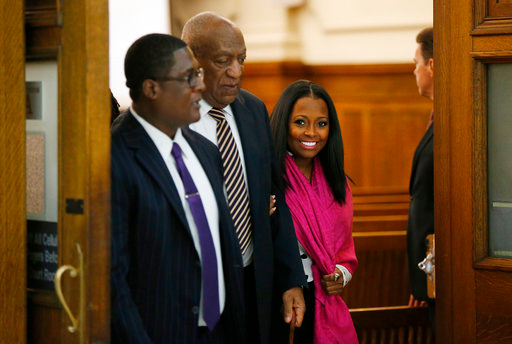By Laura Townsend
laura-townsend@uiowa.edu
On the first day of Bill Cosby’s sexual-assault trial, Cosby entered the courtroom arm in arm with Keshia Knight Pulliam, who played his TV daughter, Rudy, on “The Cosby Show.” Rudy Huxtable was the show’s adorable little girl, the wide-eyed innocent daughter of “America’s dad.” She was the symbol of Cosby’s famed fatherhood, of the wholesome family that graced so many living rooms for eight seasons. The Huxtables represented the perfect American family. As Cosby and Pulliam entered the courtroom on June 5, it was difficult to tell whether Cosby or Cliff Huxtable was on trial.
Of course, it was not a fictional television character facing charges for allegedly sexually assaulting Andrea Constand in 2005. It is not “America’s dad,” Cliff Huxtable, who has 50 years’ worth of sexual-assault allegations against him. It is Cosby. Over the years, Cosby and Cliff Huxtable have merged into one being in the eyes of many American audiences. This merging makes it extremely difficult for many Americans to comprehend that the loving father figure could have been capable of committing such heinous crimes. When Cosby appeared in court with Rudy, a hint toward nostalgia might have transported Americans back to the lighthearted TV dad they so admired.
In a time in which all news seems to mean bad news, Americans are inclined to hang onto nostalgia with all their might. “Make America Great Again” was such a genius campaign slogan partly because it relied on nostalgia, the idea of a simpler time, a time in which our TV heroes were simply fathers, not alleged sexual predators. A time in which the “All American Family” was wholesome, not tainted. Cosby’s trial marked another loss of innocence for America. It threatened to ruin our collective memory of watching wholesome television with the family.
Cosby’s trial was a hit to the African-American community, as well. “The Cosby Show” was ground-breaking in its representation of African Americans on television in a positive light. It showed African-American families as happy and loving, when much of the media portrayed families of color as dangerous, impoverished, or broken. Cosby’s TV family mattered. They were intelligent, successful, silly, big-hearted, and lovable. It is simply inconceivable that the family’s leading man would commit such crimes.
America’s reluctance to separate Cosby from Cliff Huxtable may have had an effect on the outcome of his trial. The apparent inability of at least a portion of the jury to see past his celebrity is disheartening. Cosby is yet another powerful man whose celebrity has helped determine his fate. His career is most likely ruined, and his reputation is certainly tainted, but is that enough? It is hard to turn a blind eye to 50 years of allegations, even when they are against a television hero. The disappointing outcome of this trial seems to indicate that celebrity, once again, is some kind of protective shield.
Remembering little Rudy grin widely on her TV father’s lap as a kindergartener, it is chilling to watch her enter that courtroom arm-in-arm with an alleged sexual predator. As long as the separation between character and actor continues to be convoluted, celebrity will almost certainly continue to prevail in the courtroom.



